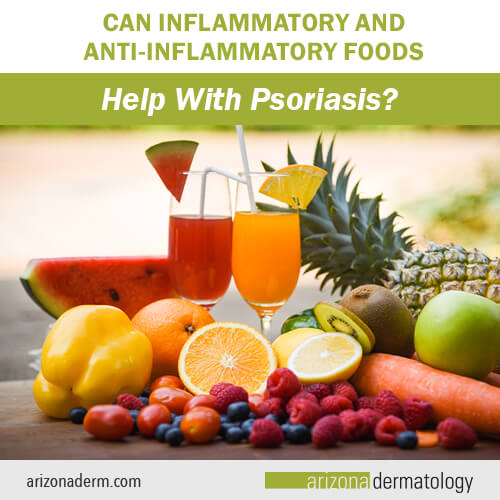 Unfortunately, no diet will cure a chronic disease like psoriasis. That said, changes in your diet can help with symptoms. Because psoriasis is an inflammatory condition, it makes sense to reduce overall inflammation in your body. Doing so can inhibit the reaction that causes psoriasis plaques to form.
Unfortunately, no diet will cure a chronic disease like psoriasis. That said, changes in your diet can help with symptoms. Because psoriasis is an inflammatory condition, it makes sense to reduce overall inflammation in your body. Doing so can inhibit the reaction that causes psoriasis plaques to form.
A 2020 study published in the Journal of Molecular Sciences sheds light on which foods you may wish to incorporate into your diet or avoid in the hopes of better managing overall systemic inflammation in your body. Here is what the science has shown us so far:
Inflammatory Foods To Avoid or Reduce
Added sugar. Too much sugar has an inflammatory effect on the body. A typical Western diet is overloaded with sugar, including “hidden” sugars like those found in breads, crackers, sauces, and salad dressings. To give you some perspective, the average American consumes 17 teaspoons of added sugar per day (that’s about the amount found in one 20-ounce bottle of Coke), when the goal should be to consume six teaspoons or fewer per day. If you are a person with a sweet tooth, this might be the first place to focus on, not only to reduce inflammation, but to reduce your risk of obesity, Type 2 diabetes, high blood pressure, and fatty liver disease.
How to make a change:
- Say no to soda. Switch to water—the healthiest way to hydrate. If you crave flavor, try sugar-free sparkling beverages, or add cucumber or lemon to still water. Skip the chemical sugar substitutes, though. They’re aren’t good for you either.
- Check labels. Ingredient lists can be tricky, with sugar masquerading as many things. If the word “syrup” is listed in the first three ingredients, that’s a red flag. Also, shoot for foods with less than 4 grams of added sugars per serving.
- Limit desserts. Do you really need a sweet treat every night? Perhaps limit desserts to weekends and special occasions. If you crave something sweet after dinner, a square of dark chocolate or a piece of fruit might just do the trick.
Red and processed meats. Both red meat and processed meats (those that have been cured, salted, smoked, or fermented to make them last longer) are high in saturated fatty acids, which contribute to inflammation in the body. Foods to reduce or avoid include bacon, hot dogs, salami, pepperoni, sausage, meat jerkies, and red meat in any form. Butter is also rich in saturated fat and contributes to inflammation.
How to make a change:
- Have one or two “meat-free” dinners a week
- Make meat a side dish and not the main affair
- Feature meat in only one of your daily meals
- Switch out cold cut sandwiches for soup, salad, or leftovers at lunchtime
Omega-6 fatty acids. Omega-6s are fats your body uses for energy. Your body cannot make them, so you get them from the foods you eat. Omega-6s are found in vegetable oils like canola, corn, safflower, sunflower, and peanut oil, as well as in mayonnaise. They are necessary for normal growth and development and healing, but unless they are balanced with Omega-3s (the fats you get from foods like salmon, walnuts, and flaxseed), they can trigger an inflammatory response.
How to make a change.
- Eat more foods rich in Omega-3s to help balance out the Omega-6s in your diet
- Use olive oil for lower-heat cooking
- Grease pans with cooking spray to reduce the amount of oil used
Refined carbohydrates. Refined carbohydrates have been stripped of nutrients and lack fiber. These highly processed foods, including breads, crackers, french fries, white rice, and sugary cereals require very little breakdown and raise your blood sugar in the same way added sugar does. In an attempt to reduce your blood sugar level, the body sets off an inflammatory response.
How to make a change:
- Choose 100% whole grain versions of the carbohydrates you enjoy, like whole-wheat bread or brown rice
- Include lots of high-fiber foods in your diet, especially fruits and vegetables
- Replace sugary breakfast cereals with whole-wheat toast or oatmeal flavored with cinnamon
Anti-inflammatory foods
In addition to foods to avoid, the study also identified a number of dietary substances which suppress the inflammatory response, potentially reducing psoriasis symptoms. These include:
- Vitamin D. Found in supplements and fortified products like milk. (We do not recommend boosting your body’s natural vitamin D production with sun exposure because of the damaging effects of UV rays.)
- Vitamin B12. Found in high concentrations in cooked shellfish like clams, mussels, and crab. Also in mackerel, trout, salmon, poultry, dairy, and eggs. Plant-based sources of vitamin B12 are nutritional yeast, tempeh, and nori.
- Dietary fiber. The way dietary fiber is digested helps to protect against inflammation. Good sources of dietary fiber include fruits, vegetables, and legumes.
- Soy. The anti-inflammatory compound genistein is found in soy products like soybeans, soy cheese, and soy milk.
- Selenium. This trace element is an antioxidant that reduces inflammation and enhances immune function. It is found in high contractions in Brazil nuts, tuna, halibut, sardines, shrimp, roasted ham, and turkey.
- Probiotics. Probiotics are good bacteria that help your body function at its best, especially when it comes to digestion. Research has shown that selective strains of the probiotics B. bifidum, Ruminococcus obeum, Blautia coccoides, and L. casei strain Shirota reduce inflammation.
Focusing on anti-inflammatory foods and avoiding the worst culprits can be part of your overall healthy lifestyle and a way to take control of your psoriasis. Combined with dermatological treatments like corticosteroid injections, biologic therapies, and phototherapy, diet changes can help you live a better, more comfortable life with psoriasis.


